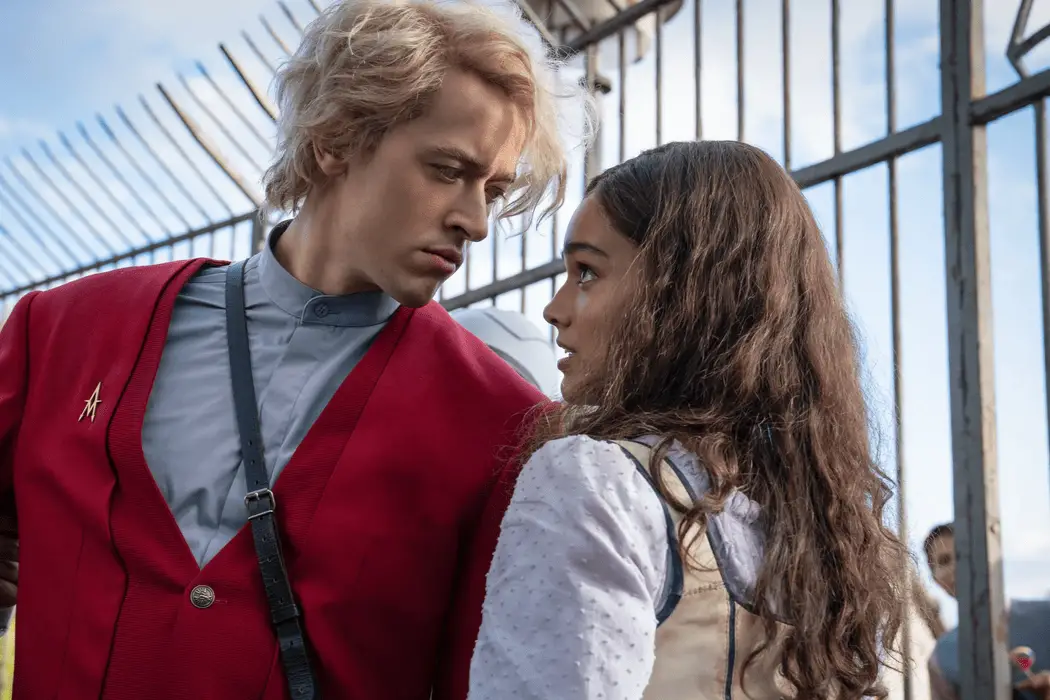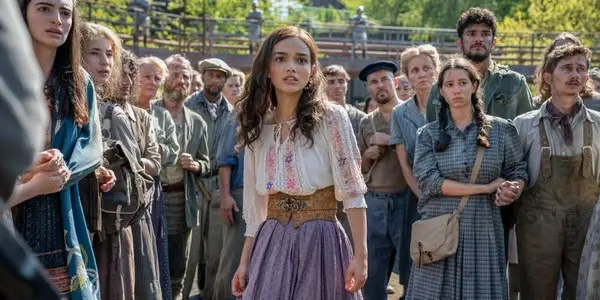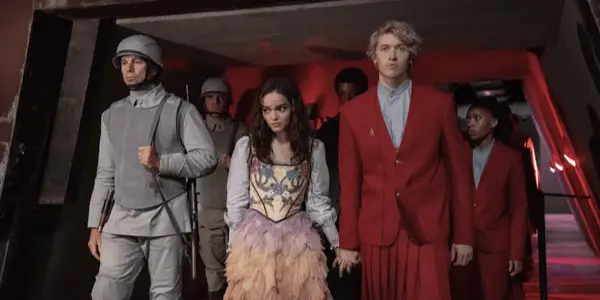THE HUNGER GAMES: THE BALLAD OF SONGBIRDS & SNAKES: Hits the Right Notes, With Just Enough Bite

Jules Caldeira is an Associate Editor for Film Inquiry based…
Fifteen years ago, the world was set ablaze by the success of Suzanne Collins’ dystopian Hunger Games book series, and the blockbuster franchise that followed, chronicling the stories of Katniss Everdeen, the Girl on Fire. Then, five years after the release of Mockingjay – Part 2, we returned to Panem with the prequel novel The Hunger Games: The Ballad of Songbirds & Snakes, whose adaptation has just made its big-screen premiere. Set sixty-four years before Katniss even considered volunteering as tribute, the film has the action and entertainment of the previous installments with a new perspective — that of someone living in the Capitol.
The Rise and Fall of Snow
Three years before the inaugural Hunger Games, we’re introduced to a very young Coriolanus Snow and his older cousin Tigris as they struggle to find food. They come home to learn that Coriolanus’ father, a general, was killed during the rebellion. Fast-forward thirteen years, and we find Coriolanus (Tom Blyth) now grown, still living with his cousin (Hunter Schafer) and their Grandma’am (Fionnula Flanagan). They’re still struggling to get by, even as the Capitol thrives around them, with Tigris using the bathroom tiles to repair his shirt buttons, or going without food so Grandma’am can eat. At school, it’s announced that rather than the top student receiving the coveted scholarship to the Capitol university, twenty-four of them will become mentors for the Tributes in the tenth annual Hunger Games, with the winner being determined by whose mentee is presented as the biggest spectacle. Already, we begin to see the origins of the Games as we first learned of them all those years ago.

After Dean Highbottom (Peter Dinklage) assigns each student their Tribute, Coriolanus finds himself paired with Lucy Gray Baird (Rachel Zegler), a resident of District 12 who immediately stands out to viewers by putting a snake down the shirt of the Mayor’s daughter, then defiantly singing to the crowd and cameras. So begins Coriolanus’ journey to mentor Lucy Gray not only to survive, but to win the hearts and minds of viewers at home while also providing the ruthless Head Gamemaker Dr. Gaul (Viola Davis) with suggestions on how to improve the Games’ viewership, such as allowing people to sponsor Tributes and send them gifts during the Game.
A Pretty Picture of Panem, With Masterful Music
Once again, Francis Lawrence — the director of the franchise since Catching Fire — has succeeded in immersing us in the unique world that is Panem. From the luxuriant architecture of the Capitol, its citizens once more adorned in the beautiful outfits they’re known for (though not as elaborate as they will be in Effie Trinket’s day), to the disparate bleakness of Lucy Gray’s District 12, not much different from the one we’ve become familiar with. However, through Lucy Gray’s music — perhaps one of the true highlights of this film — we feel the struggle and pain of these people. Produced by Grammy Award-winner Dave Cobb, well-known for his work with country and folk artists, these songs showcase the Appalachian vibe the District is so clearly based on, and Zegler’s talent combined with poignant lyricism pierces your heart with each pointed note.

As with the rest of the franchise, this film brings the familiar themes of classism and totalitarianism with a new perspective: that of those inside the Capitol. As the events of the Games unfold, we see some viewers moved or even disgusted by what they witness, in contrast to what we’ve seen before with Capitol residents being out-of-touch or even ignorant to the atrocities. In addition, the living conditions of the Snows is a surprise in the sense that we’ve been previously led to believe that everyone in the Capitol is wealthy and hedonistic, to the point of even drinking concoctions to force themselves to vomit in order to eat more food while other districts starve. Coriolanus is also friends with Sejanus (Josh Andrés Rivera), a boy who actually used to live in District 2 before moving to the Capitol and thus has a dual perspective on the Games. Such viewpoints further develop the world of Panem and show us that just as in our world, there can be conflicting viewpoints and shades of gray.
Some have balked at the fact that the film wasn’t split into two parts to fully adapt the source material, something Lawrence considered, but this may have worked to its benefit. While it can be detrimental to a fanbase when IPs aren’t 100% faithful, in a world where so many have gone the way of the two-parter (Harry Potter, Twilight, Mission: Impossible, even Mockingjay to the director’s regret) it could seem to be more of a cash grab.
CONCLUSION
Though the nearly three-hour runtime certainly seems daunting, the characters and music, to say nothing of the tense, action-packed event that is the Hunger Games, drive this film forward and deliver a powerful tale from a beloved universe.
The Hunger Games: The Ballad of Songbirds & Snakes is in theaters now.
https://www.youtube.com/watch?v=NxW_X4kzeus
Does content like this matter to you?
Become a Member and support film journalism. Unlock access to all of Film Inquiry`s great articles. Join a community of like-minded readers who are passionate about cinema - get access to our private members Network, give back to independent filmmakers, and more.
Jules Caldeira is an Associate Editor for Film Inquiry based in Sacramento, CA. He's a drummer, part-time screenwriter, and full-time Disney history nerd who can be found on social media when he remembers to post, and can be contacted at [email protected].













